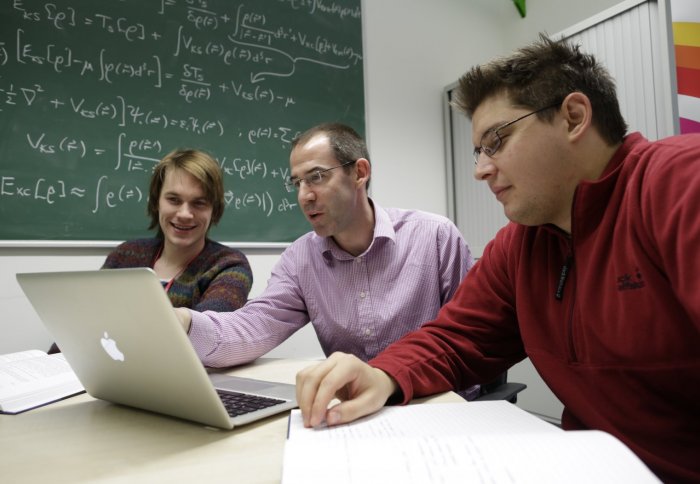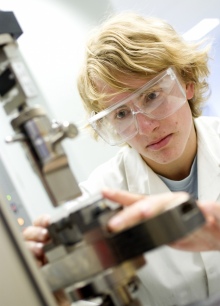Imperial keeps best ever score for student satisfaction
by Jon Narcross

Imperial has held onto its best ever rating in this year's National Student Survey (NSS) results with overall satisfaction of 87%
In this year’s results 87% of the final-year survey participants at Imperial “definitely” or “mostly” agree that their overall experience at the College was satisfactory. This matches last year’s highest ever performance by the College and is 1% higher than the sector average of 86%. This year also saw the highest ever response rate for the College with 84% of eligible students taking part in the survey.
I’m pleased the results show the continuing benefits of the improvements we have already made across the College, but we will continue to do more.
– Professor Debra Humphris
Vice-Provost (Education)
The survey revealed continued progress in the Academic Support category with an 83% satisfaction rate, a 4% increase on last year. Satisfaction with Assessment and Feedback also increased by 1% taking it to 67%, a 13% increase since 2011.
The results see the College above the sector-wide average for all categories across the survey except Assessment and Feedback (-5%) with student satisfaction for Learning Resources 10% higher than the sector average of 85%.
The results place the College first among Russell Group universities in London and 14th in the Group overall, up one place from last year.
We are pleased to see the College continuing to make efforts to improve the student experience here at Imperial. The Union is working closely with the College to build on this year’s results and to make sure Imperial is the best it can be.
– Tom Wheeler
President, Imperial College Union
“I’m very grateful to those now graduated students who completed the survey and to everyone across the Imperial community who work to ensure we provide the world-class educational experience our students expect.”
Imperial College Union played an important role in championing the importance of participation in the survey - leading to a record 1741 respondents taking part. The 84% response rate is an, an increase of 3% from last year saw and the highest in the College’s history.
Imperial College Union President Tom Wheeler said: “We are pleased to see the College continuing to make efforts to improve the student experience here at Imperial. The Union is working closely with the College to build on this year’s results and to make sure Imperial is the best it can be.
“The Union will again this year publish its response to the NSS in the autumn with recommendations on how the College can learn from these results to further enhance the student experience here at Imperial.”
Spotlight on Medicine
The School of Medicine were one of the big improvers this year with overall satisfaction increasing 7% to 90% - putting it 4% above the sector average.
Martin Lupton, Head of the Undergraduate School of Medicine, puts the improvements down to greater emphasis within the school on listening to students’ feedback: “We’ve spent a lot of time actively listening to our students and it’s clearly had an impact. We have strong staff-student liaison groups, town hall meetings with our students and I have a lunch each week with a group of 12 -14 students randomly chosen from across the school. These help us identify exactly where there are issues and how we can best address them. It was this kind of feedback that led us to revamp our tutoring system, bringing in a smaller number of well-trained tutors with allocated time to undertake the role.”
 Susan English, Director of Education Management, also highlighted the strong sense of community within the medical school as a contributing factor to the positive environment: “Led by Jenny Higham, Vice-Dean (Education and Institutional Affairs), there’s been a push to raise the profile of the School and develop a stronger identity which I think has helped increase the feeling of community for our staff and students. When you have over 2,000 students operating over four teaching sites, 30 hospital sites and dozens of general practices it can be a challenge to instil a sense of belonging. We also have increased the emphasis on celebrating students' progression through their studies. For example, we have a welcome dinner with all first year students and staff and a 'white coat' ceremony, when they commence their Year 3 clinical attachments so that staff and students come together to celebrate this milestone.”
Susan English, Director of Education Management, also highlighted the strong sense of community within the medical school as a contributing factor to the positive environment: “Led by Jenny Higham, Vice-Dean (Education and Institutional Affairs), there’s been a push to raise the profile of the School and develop a stronger identity which I think has helped increase the feeling of community for our staff and students. When you have over 2,000 students operating over four teaching sites, 30 hospital sites and dozens of general practices it can be a challenge to instil a sense of belonging. We also have increased the emphasis on celebrating students' progression through their studies. For example, we have a welcome dinner with all first year students and staff and a 'white coat' ceremony, when they commence their Year 3 clinical attachments so that staff and students come together to celebrate this milestone.”
This year’s results for medicine have seen improvements across all of the surveyed areas. As well as overall satisfaction increasing, improvements in Academic Support of 13% and Organisation and Management of 15% were the highest by any department College-wide.
Chris Harris, Quality and Educational Development Manager added, “It’s important to stress though that we’re not complacent. We’re over the moon with this year’s results but there is lots more still be done. We’ve made a commitment to continue listening to our students and working with them to improve their experience and that’s what we’re going to do.”
Spotlight on Materials
Materials was another department that recorded strong results this year, seeing their overall satisfaction increasing by 3%.
Its Head of Department, Professor Neil Alford, said the department was pleasantly surprised by this year’s results when they were announced: “We implemented a number of measures and you’re never sure how it’s going to turn out. We were bumping along last year and not really making the improvements we wanted to see so we set up a working group to look at what needs to be done and it has really paid off.”
 Whilst overall satisfaction improved it was the Assessment and Feedback category that saw the biggest increase. This year’s score of 80% is a 10% increase on last year. “We introduced a new mechanism for improving feedback”, Neil explained, “Making sure students know how long the can expect to wait for feedback on their work and making sure we as staff meet that expectation is particularly important.”
Whilst overall satisfaction improved it was the Assessment and Feedback category that saw the biggest increase. This year’s score of 80% is a 10% increase on last year. “We introduced a new mechanism for improving feedback”, Neil explained, “Making sure students know how long the can expect to wait for feedback on their work and making sure we as staff meet that expectation is particularly important.”
Neil also highlighted the importance of engaging everyone in the Department in the process of improving results: “I think the success of the changes we made lies in the way we got buy-in from students, academic staff and administrative staff too. Having everybody on board working towards the same thing really made a difference.”
The challenge now for the Department is keeping the strong results going forward: “We’ve already got our plan for our next steps, Neil added, “we’re going to be completely revising undergraduate laboratories, bringing in state-of-the-art equipment such as mini electron microscopes and x-ray diffractometers. We’ve already introduced new experiments which have been really popular with students. Our field is an experimental science so it is important that students have access to the latest equipment. This is something we’re working to make happen for students across the whole Department.”
Article text (excluding photos or graphics) © Imperial College London.
Photos and graphics subject to third party copyright used with permission or © Imperial College London.
Reporter
Jon Narcross
Communications and Public Affairs